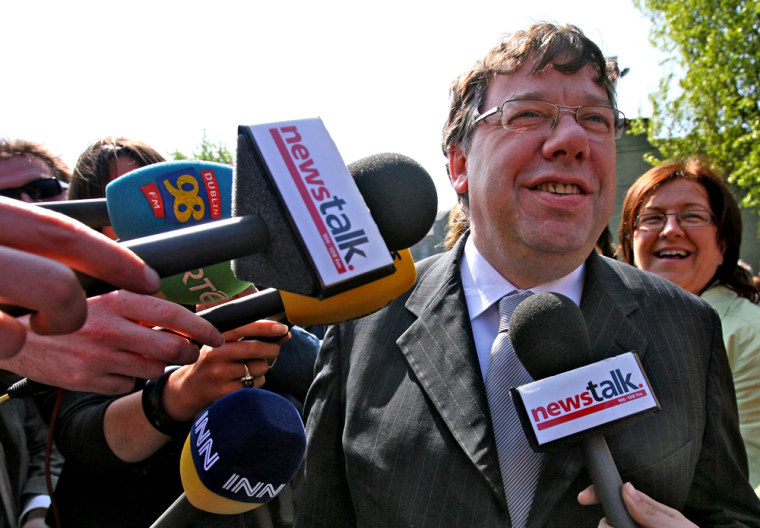Finance Minister Brian Cowen was elected Ireland's new prime minister Wednesday, and he pledged to guide the country on a continued pro-European course through choppy economic waters.
Cowen won in an 88-76 vote in Dail Eireann, Ireland's parliament. He received support from all three parties in the government of his predecessor, Bertie Ahern, who stepped down Tuesday after 11 years in power. Cowen immediately shook up the Cabinet, appointing new ministers of finance, justice, foreign affairs and several other posts.
A downcast-looking Ahern and lawmakers from all parties offered Cowen a standing ovation. Outside parliament, Cowen was mobbed by cheering, singing well-wishers as police escorted him to his prime ministerial Mercedes.
During his acceptance speech, Cowen's voice quivered with emotion as he noted that his political career began amid tragedy when his lawmaker father, Ber, died of a heart attack.
Cowen's wife, mother, two brothers and two daughters were watching from the public gallery above. In a precedent-setting move, they also accompanied the new prime minister to a meeting with Irish President Mary McAleese, the symbolic head of state, where Cowen received his seal of office.
"I accept the honor with a genuine sense of humility. That sense is engendered in large part by my love for Ireland. This is a wonderful country. We are a fortunate people," Cowen told the parliament.
A long list of experience
Cowen, 48, has represented his native Offaly, an overwhelmingly rural county in the Irish midlands, for half his life. He won a 1984 by-election caused by the death of his father. He has led six government departments since 1992, amassing a breath of experience equaled only by Ahern.
Unlike Ahern, an affable Dubliner who charmed even as he baffled listeners with his sloppy use of language, Cowen has a no-nonsense style low on blarney.
Cowen demonstrated his characteristic brusqueness as he unveiled, rapid-fire, a series of new Cabinet appointments. These were triggered because he needed to fill his own previous two posts, deputy prime minister and finance minister.
He appointed lawmaker Mary Coughlan to be his deputy prime minister as well as Ireland's new minister for enterprise, trade and employment.
Coughlan, 42, previously served as agriculture minister. Her political profile received a populist boost last year when, while campaigning for re-election, her foul-mouthed exchange with a farmer was broadcast nationally.
Brian Lenihan, the previous justice minister, became finance minister — long considered the essential staging post to becoming prime minister. Lenihan, 48, comes from one of Ireland's premier political dynasties: His late father and aunt were both Cabinet ministers, while his younger brother is also a junior government minister.
Micheal Martin, the previous enterprise minister, became Ireland's new foreign minister. Dermot Ahern was moved from foreign affairs to justice.
A time of economic fears
Cowen said his top priority in coming weeks was to lead a successful referendum campaign for the European Union's next treaty. Ireland is the only EU member subjecting the Treaty of Lisbon to a popular vote — and an Irish rejection June 12 could delay or block the painstakingly negotiated treaty.
Cowen noted that Ireland had benefited greatly from its 35-year membership in the European Union, and has grown ethnically diverse on the back of more than a decade of rapid growth that has attracted immigrants from throughout the EU.
He said a "yes" vote would "secure our place in the heart of Europe," while rejection would "only weaken our position and influence."
Cowen's rise comes at a time of rising economic fears in Ireland, which has thrived as a low-tax base for more than 600 U.S. high-tech multinationals. Unemployment this year has risen to 5.6 percent, a decade high. Government tax coffers dependent on Ireland's long-booming housing market have fallen sharply into the red because of a sudden dropoff in property sales.
Cowen said he expected labor unions not to make exorbitant salary demands in a new round of national wage-pact negotiations that opened this month in Dublin. Such pacts have underpinned Irish economic growth and discouraged strikes for the past two decades, but union chiefs are demanding rises in excess of Ireland's 5 percent inflation rate.
"We know only too well, from our relatively recent economic history, that the wrong policies, the wrong decisions, the wrong behavior, can carry a very high price in an economy as open and dependent on international trade as we are," he said. "The scale of the challenges we face require a major response by all of our people."
